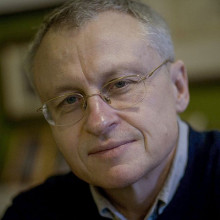Polish literature

Jan Polkowski
He was considered – and rightfully so – to be a part of oppositionist literature circles, a movement that in a strong, explicit and consistent way resisted – in the author’s words – the “inhumane authorities” and “their criminal activities.” But Polkowski’s poems were – and are still today – not only a demonstration of dissent, an act of struggle, a gesture of protest against the absurdity and idle horror of real socialism. Then – from the late 1970s until 1990, from his debut in the underground periodical “Zapis” (“Record”) to Elegie z Tymowskich Gór (Elegies from the Tymowskie Mountains) – Polkowski was establishing a new tone of Polish poetry. A high, clear, moving tone. From the maltreated Polish language of the times, he extracted something that sounded – and still sounds – like an assuredly struck chord, like a clearly directed musical phrase that puts in tune dispersed notes and the key of existence, unites in a strong twine: agitations of words and imagination, high registers of culture and the prose of life, the tingling of memory and the thrill running down a body. Polkowski’s in his poems – both the old ones and the latest – subscribes to the kind of poetry that understates its own desires, forgets “about itself even for an instant” and opens up to an “anonymous, inexpressible message”, becomes a listening, an affection, a restoration of memory, an embodiment of a lost existence into words. Such poetry intently listens to silence in which the dead and the forgotten remain. From this silence it learns to sing. From the dead it learns faithfulness. From the forgotten – living quietly. Such poetry looks into the abyss of death – it tries to fathom something smouldered in the breath of the abyss, the waft of nonexistence. It also attempts to “come closer”, come “as close as it is possible” to that which is the “persistence”, the “journey”, the “resurrection”, but also is “blurred and unrecognized and scattered and unborn” (Głosy - Voices). In this strange and deeply unsettling way the dead exist. And so exists the love that still connects them to the living. A defenseless, helpless love – simple, naïve, brave. Sometimes hidden in powerless anger, in rankling, quiet pain, in despair. This similarity is our fate – the fate of the living and the dead. The fate of all of us – constantly forgotten, fading, gradually consumed by the darkness. It remains a mystery to me, how the words pieced together by Jan Polkowski into phrases of poetry seem properly used. Maybe the poem turns them into a real entity? Maybe it is thanks to them that thoughts remain alive, imagination doesn’t atrophy? Maybe this affection of poetry soothing the wounds of words reaches me through them. Maybe I’m repeating after the poet the phrases pulled out of the darkness and allowing them to live in me in hope that “they will become a prayer again”? I don’t know. So I’m listening in to this clear tone of a Sunday morning – the “psalm of the abyss”. And I’m doing so with a belief that Polkowski’s poems have some of the solemnity and necessity of the words heard in a dream, some elements of an intimate ceremony, a holiday liturgy, in which we took part in our childhood and which still remains in us.
BIBLIOGRAPHY
- To nie jest poezja, NOWa, Warszawa 1980.
- Oddychaj głęboko, ABC, Kraków 1981 (wyd. 2 rozszerzone, poprzedniego tomu).
- Ogień. Z notatek 1982–1983, Półka Poetów, Kraków 1983.
- Wiersze. 1977–84, Puls, Londyn 1986.
- Drzewa. Wiersze 1983–1987, OL, Kraków 1987.
- Elegie z Tymowskich Gór i inne wiersze, Znak, Kraków 1990.
- Elegie z Tymowskich Gór 1987–1989, Wydawnictwo Literackie, Kraków 2008.
- Cantus, Wydawnictwo a5, Kraków 2009.
- Cień, Znak, Kraków 2010.
- Głosy, Wydawnictwo M, Kraków 2012.
- Ślady krwi. Przypadki Henryka Harsynowicza (powieść), Wydawnictwo M, Kraków 2013.
- Gorzka godzina, Sic!, Warszawa 2015.
-
Gdy Bóg się waha. Poezje 1977–2017, Wydawnictwo JMR Trans-Atlantyk, Warszawa 2017
-
Pochód duchów, Topos, Sopot 2018.
-
Portier i inne opowiadania, Instytut Literatury, Kraków 2019.